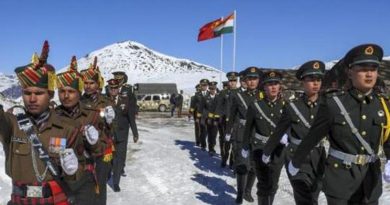How Al Jazeera uses Coronavirus rumors to undermine Qatar’s rivals
by Mohamed Maher and Irina Tsukerman
Al Jazeera’s role as instigator, obfuscator, and distorter of news long precedes the instant COVID—19 pandemic crisis.
The media plays an important role in educating the public, revealing facts and monitoring the various authorities in normal peace times, but it also plays a dangerous role in times of crises, wars, and epidemics, as it is incumbent on them to educate the public about the upcoming danger and how to prevent it.
It is assumed that the media’s loyalty to the truth, and the truth only, as it is supposed to have a moral and humanitarian responsibility towards peoples and societies in the first place.
However, Al Jazeera, the Qatari channel linked to the Doha government chose for it another path, and despite the depth of the current global crisis towards confronting the Coronavirus, this did not deter the Qatari channel from continuing its process of fabricating news and publishing false news for purely political purposes, to provoke the few and crises.
And just over the past few days, Al Jazeera has published widely, an inaccurate and weak Canadian study indicating that the numbers of the cases in Egypt include 19,000, which is a very exaggerated number if we consider that the official figures at that time, when the study was published, was no more than 200, which prompted the Egyptian government to refute such allegations, also withdrew the accreditation of the British Guardian reporter, and issued a warning to the New York Times correspondent in Cairo, which made him latter apologize for his previous tweets on Twitter about the numbers of the cases in Egypt.
The British daily reported that its correspondent, Ruth Michaelson, left Egypt last week after Western diplomats informed her that Egyptian security services wanted her to leave “immediately”, the daily said.
Michaelson reported on unpublished research by Canadian infectious disease specialists estimating an outbreak size of more than 19,000 cases in Egypt. The scientists used data from early March when Egypt officially had only three confirmed cases, according to Michaelson’s report published on March 15.
The following day, Michaelson, along with a New York Times reporter who tweeted her story, was summoned by Egyptian officials and told they were accused of misreporting and spreading panic, The Guardian said.
A day later, Egypt’s State Information Services, the government-body overseeing foreign correspondents, SIS demanded an apology from the Guardian for publishing the report that cited a Canadian medical doctor’s study claiming that infected people in the country may amount to more than 19,000. The official number stands at 196, with six deaths and 26 recovered cases at the time of writing. SIS revoked Michaelson’s press credentials and released a statement accusing her of citing a “misleading” study based on “false conclusions” and “speculation”.
Several days later, the French ambassador in Cairo publish a video message to the French community in Egypt, inviting them to sit in their homes in Egypt until the end of the crisis, but Al-Jazeera and a several of other channels close to the terrorist Muslim Brotherhood received the message to turn it into a warning to the French people in Egypt, before the difficult days, even though the ambassador spoke in general, which made the French embassy in Cairo issue an official statement indicating that the translation from French to Arabic was not accurate for some channels, and some of them distorted the ambassador’s statements in a manner inconsistent with the intended goal of the message in reference to translation.
The history of Al Jazeera:
Al Jazeera’s role as instigator, obfuscator, and distorter of news long precedes the instant COVID—19 pandemic crisis.
The recent four hour coverage dedicated to the largely debunked claims by Amazon’s Jeff Bezos regarding his phone. allegedly hacked by the Saudi Crown Prince from his personal Whatsapp account, is just one example of Al Jazeera seizing any manufactured scandal, and amplifying even issues of narrow interests until they appear larger than life.
This episode, however, is only a minor illustration of the way Al Jazeera either fuels or takes advantage of existing social or political crises. Manufacturing an appearance of crisis when the issues is relatively minor is also part of the media conglomerate arsenal. Not so long ago, Al Jazeera and affiliate channels, and various European and Arabic-language outlets funded by Al Jazeera or Qatar have pushed the story of immense anti-government demonstrations allegedly taking place in Egypt.
These stations have gone as far as to interview alleged participants and witnesses to these supposedly mass gatherings. Meanwhile, 24-hour cameras that were set up to transmit the developments in the hotspots in questions showed empty streets, occasionally interrupted by small crowds. Eventually, Al Jazeera’s narrative made it out into major Western networks and newspapers.
The Independent covered these protests as almost revolutionary in nature. Ultimately, Reuters revealed, that in reality, the gatherings were rather small, and no military force was used. The Sisi government was not particularly flummoxed either by the protests, or by the concerted attempt to make them appear like the second coming of the Arab Spring.
This attempt to manufacture an appearance of crisis served two purposes: the first was to inspire a more massive revolt among those who found Al Jazeera more credible and “free” than Egyptian media or who simply did not like President Sisi.
The second was to send a propaganda message to the West, in the hopes that the mainstream press will rely on Western-style networks, often without verifying through independent coverage or through associations with local reporters. The idea is that American or British journalists will consider local Egyptian press “biased” in favor of the government and automatically disregard those perspectives.
Indeed, Al Jazeera partially succeeded having captured headlines in a number of Western national publications that played into the narrative of mass opposition to the Sisi government..
Neither of these modes of action have much to do with journalism, in the conventional understanding of the term. Instead, Al Jazeera strives to be the newsmaker and the narrative make at the same time, rather than merely breaking or analyzing the news based on best available evidence.
Al Jazeera has a long history of jumping on board with various uprisings and revolutionary movements and picking and choosing “winners” that receive disproportionate coverage, and thus, an inherent advantage of free media publicity.
The 2019 Cairo protests followed Al Jazeera’s much more successful involvement in the Arab Spring in Egypt and other countries, where Al Jazeera’s coverage buoyed Morsi to victory even as the channel essentially ignored more secular-minded candidates and their supporters.
Similarly, in Sudan, Al Jazeera gave space to young protesters to air grievances while shaping a version of the events which placed blame on the anti-protester violence on Saudi Arabia, UAE, and Egypt.
The conglomerate’s presence in Libya has played a very similar role, and has likewise played up the violent anti-government riots popping up in Malawi following the disputed elections in 2019. The coverage of all these conflicts and crises is narrative driven, and often inaccurate, if not outright fabricated. The same trend can be observed in the coverage of the Khashoggi affair, where Al Jazeera aired the most preposterous claims without ever fully retracting any of them.
Far from being an objective observer of the investigation, Al Jazeera frequently allowed deeply personal and sensationalist attacks on Mohammed bin Salman, who was at the very start portrayed to be a cartoonish villain. And long before Khasoggi was ever on the radar of most of the Western public, Al Jazeera was on the ground in Afghanistan, apparently facilitating Taliban and giving a welcoming space to Al Qaeda on air as well as via logistical support.
Rather than merely covering the conflict, the media conglomerate was at the center of it and taking active part in calling shots through coordinating with the preferred parties. Likewise, in the United States and the United Kingdom, Al Jazeera worked to help shape public perception of Jewish organization and acceptance of old school anti-Semitic conspiracy theories through spy operations that were later turned into documentary narratives and leaked to left wing outlets.
What do all of these incidents of political meddling, dispensation with journalistic objectivity, and outright fabrications have in common? Al Jazeera was engaged in these narrrative-building exercises as a media and psychological warfare outfit for Qatar’s foreign policy.
While many analysts have referred to Al Jazeera as a “mouthpiece” for Qatari agenda, that is not quite the right term, as in addition to airing preferred Qatar regime perspective, Al Jazeera specifically has been used to influence foreign policy as a lobbyist, propagandist, and employer of active measures.
Despite Congressional push to designate the media conglomerate under Foreign Agents Registration Act (FARA), Al Jazeera has been able to avoid scrutiny both through legal charades and by touting a strong relationship with the White House, with Jared Kushner making occasional appearances on the channel and welcoming it as a partner and an “important actor in the region” to the White House.
The converse to this observation is Al Jazeera’s relative silence or positive coverage with regards to Qatar’s allies, such as various militias funded by the government in Libya and Syria, or for that matter, internal Qatari matters, such as the disputes within the al-Thani family or human rights abuses.
To figure out how and why Al Jazeera chooses to focus on certain matters, one should only look for Qatar’s interests in the issue. Antagonizing the members of the Anti Terrorism Quartet (KSA, UAE, Egypt, and Bahrain) is always on the agenda.
Wreaking havoc and undermining criticism of Qatar’s geopolitical agenda in Western countries is another. For that reason, it should come as no surprise, that despite Qatar’s attempts to cover up the rapid spread of the pandemic inside its own borders, rather than criticizing the policy shortcomings, such as open ended travel to Iran and Oman, Al Jazeera focused on searching for and creating problems externally, in part to divert attention from the problems in Qatar, and in part because any crisis can be exploited to sow the seeds of Qatar’s longer-term interests in exerting influence, preferably at the expense of others.
Mohamed Maher is an Egyptian journalist and researcher based in the United States.
Irina Tsukerman is an American lawyer and analyst based in New York. She has written extensively about foreign policy and security issues for a variety of local and international think tanks. Her writing has been translated into Arabic, Farsi, Spanish, French, Portuguese, German, and Indonesian.
Featured image by Abdulaziz Rabea – AlRiyad.com



